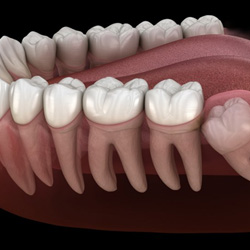Wisdom Tooth Extraction – Calimesa, CA
Prevent Infections and End Chronic Oral Pain
The wisdom teeth are the third and last set of molars to emerge, and many people do not have adequate room in their mouths to accommodate them. The eruption of the wisdom teeth causes issues like chronic pain, dental shifting, and infections for many people, so it is often necessary to remove them to preserve a patient’s oral health. Here’s a brief overview of why Dr. Parker may recommend wisdom tooth extraction, but please contact our staff if you’d like to know more.
 Unfortunately, toothaches are
seldom just a toothache. It’s more common for them to be an indication that there’s a serious
problem with your oral health. When conditions like cavities and gum disease threaten to spread throughout
your mouth, we can provide prompt treatment with a tooth extraction in Calimesa. Once the source of your
pain is removed and we’ve restored your oral health, you’ll feel much better!
Unfortunately, toothaches are
seldom just a toothache. It’s more common for them to be an indication that there’s a serious
problem with your oral health. When conditions like cavities and gum disease threaten to spread throughout
your mouth, we can provide prompt treatment with a tooth extraction in Calimesa. Once the source of your
pain is removed and we’ve restored your oral health, you’ll feel much better!
Why Choose Dr. Scott Parker for Wisdom Tooth Extractions?
- Compassionate and Experienced Dentist
- End Persistent Dental Pain
- Prevent Many Oral Health Problems
 What Are Wisdom Teeth?
What Are Wisdom Teeth?
Before humans figured out how to cook food, they relied on their teeth to grind tough raw plant and animal matter into a pulp that could be easily digested, and the third molars played a crucial part in this process. The average size of the human jaw has slightly decreased since then, which often leaves the wisdom teeth with inadequate room to emerge properly. While the third molars do not always need to be removed, this is often the best thing for the patient’s comfort and oral health. Interestingly, some research suggests that people are more likely to have enough room for their wisdom teeth if they eat tougher foods early in their development, and some people are born with only one, two, or three of these teeth or none at all.
 Why Do Wisdom Teeth Need to Be Removed?
Why Do Wisdom Teeth Need to Be Removed?
If the wisdom teeth emerge when the mouth does not have enough room for them, they can lead to a number of serious oral health problems such as crowding, dental misalignments, chronic pain, destructive infections, and greater difficulty with dental hygiene. You may need your wisdom teeth removed if you experience pain when eating, jaw stiffness, bad breath, or difficulty opening your mouth.
 What to Expect from the Wisdom Teeth Procedure
What to Expect from the Wisdom Teeth Procedure
The process of removing wisdom teeth begins with administering an appropriate anesthetic to ensure your comfort. Then, your dentist will lift the wisdom teeth from the gum tissue using a special device called an elevator before grasping it with forceps and gently working it loose from its connective tissue. You will most likely need to have a trusted individual give you a ride home after the procedure, and we will provide you with detailed aftercare instructions to help ensure that your healing process goes smoothly.
 Recovering from Wisdom Teeth Extraction
Recovering from Wisdom Teeth Extraction
After having your wisdom teeth removed, you may experience temporary side effects like facial swelling, bleeding, and discomfort. It’s especially important to practice excellent oral hygiene while taking care to avoid disturbing the extraction site during the healing process. Dry socket is a severely painful condition that can happen if the blood clot over the wound is broken or dislodged, so it’s important to avoid spitting and drinking through a straw while recovering to prevent this issue. We advise sticking to a soft diet that includes nutritious items such as soup, yogurt, steamed veggies, ice cream, and mashed potatoes until you can enjoy tougher fare comfortably. You’ll also need to take any prescribed medications as directed to prevent infections and reduce discomfort, and we’ll be happy to answer any questions if you have any concerns.
